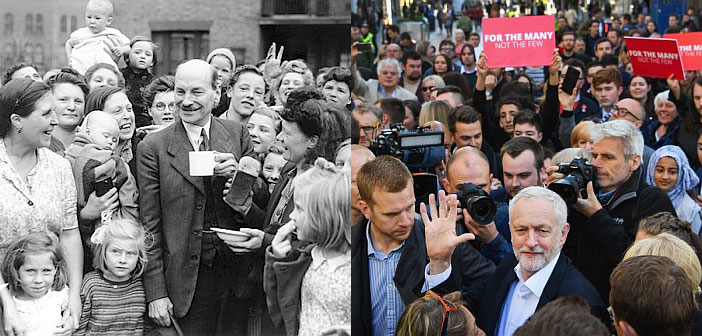Source: The Guardian 17 May 2017
My generation is the last to remember the destitution of life in Britain before the NHS and the welfare state. Heed our warnings, before we are gone.
It was at Bradford University on Tuesday that Jeremy Corbyn unveiled the Labour party’s election manifesto. In the grand hall, Corbyn spoke to an enthusiastic gathering of students and party faithful about the concrete plans Labour has to transform Britain into a country where the many will prosper instead of the few. Corbyn spoke about the need to properly fund the NHS, provide free tuition to students, end the blight of zero-hours contracts, and raise the living wage to £10 an hour.For me, a man who was born and bred in the harsh poverty of Britain after the first world war, it was inspiring. But what moved me most was the venue he chose to announce this manifesto of equality and fairness – because Bradford University is built on ground that, in my youth, was a site of great suffering and death.
You see, within the boundaries of what is now the university campus, my boyhood dreams and idealism were crushed under the cruel weight of austerity during the Great Depression. When I was young, this was not a place where one’s future was made but where it was condemned. The grounds that now hold this university contained a slum, and hope never penetrated its dark, enveloping canopy of destitution.
My family arrived in the neighbourhood that once covered this well-maintained university as penniless and jobless economic migrants from Barnsley in 1929. Then, it was an endless, warren-like landscape of dilapidated houses that nestled in cul-de-sacs where no one expected to enjoy either a decent or a long life because there was no welfare state or NHS. If hard luck struck, all that was available was poor relief, which paid a mean weekly stipend that guaranteed either starvation or homelessness.
My family couldn’t survive on poor relief, so we ended up living cheek by jowl in a doss house with a multitude of other desperate characters. Like us, all of them had been washed up on its doorstep like the flotsam that crashes on to a desolate beach after a terrible tempest. Soldiers from the first world war who had been promised a land fit for heroes by lying politicians resided in the doss where my family kipped. During the day, they still tried to hold themselves up bravely.
Like my dad, these Tommies looked for work in a city whose factories had been hushed by the collapse of the world’s economies. But at night when they tried to sleep, weary from unemployment and PTSD, I’d hear their cries of terror because their dreams had sent them back into battle at Ypres or the Somme.
As for me, my childhood was a nightmare of indentured servitude and malnutrition. At bedtime, my sister and I would huddle together for warmth on a piss-stained flock mattress on an unlit garret floor. We would try to quell the gnawing in our stomachs by wondering what our king had eaten for his tea that evening.
Even while playing, my boyhood was never blissful. In this part of Bradford I was always reminded that death for the poor is miserable, brutal and lonely: from open windows, I heard the inhuman howls of cancer sufferers dying in agony because poverty denied them the dignity of morphine.
But all of that changed in 1945 when, at the end of the second world war, the Labour party fought a general election on a manifesto that promised the creation of the NHS, affordable education, an end to that era’s housing crisis and fair conditions for all workers. The Labour party’s 2017 election manifesto echoes the sentiments found in Labour’s 1945 manifesto that inspired my generation to build a just society.
When I remember all the pain and sadness that once populated the part of Bradford that now houses its university, I can’t think of a better tribute to all those whose lives were blighted by the Great Depression than for Labour to have unfurled its manifesto here for the nation to see.
But I fear that the 2017 manifesto, no matter how just and how right for our times, may not catch the wind it needs to help this country sail forward to hope and prosperity because we have forgotten the hardships, tragedies and triumphs of my generation. It’s sad for me to ponder how on Remembrance Sunday people speak solemnly about their commitment to never forgetting those who fell in war, while those uncountable lives that were cut short because of economic injustice throughout the early part of the 20th century are forgotten.
I can tell you, as a very old man, that I am afraid for the future of ordinary people in Britain. Because by the time the next general election is scheduled, in 2022, most of those from my generation, who have survived for so long, will be dead or incapacitated. No one then may be left alive to remember the profound suffering, the hardship, the sorrow and the eventual victory all those nameless, ordinary people achieved in 1945 with election of a Labour government.
Forgetting them, and the lessons your parents or grandparents taught you from their lives about how to overcome austerity and build a proper and just society, will condemn you to something far worse than I experienced growing up.
Harry Leslie Smith ((25 February 1923 – 28 November 2018) grew up in 1930s Great Depression. He was a second world war veteran and, until his death at 95, he remained an activist for the poor and for the preservation of social democracy. He wrote 3 books of memoirs and two books of political memoir. His most famous book is the highly acclaimed Harry’s Last Stand. His last book, published in 2017, was Don’t Let My Past Be Your Future.

